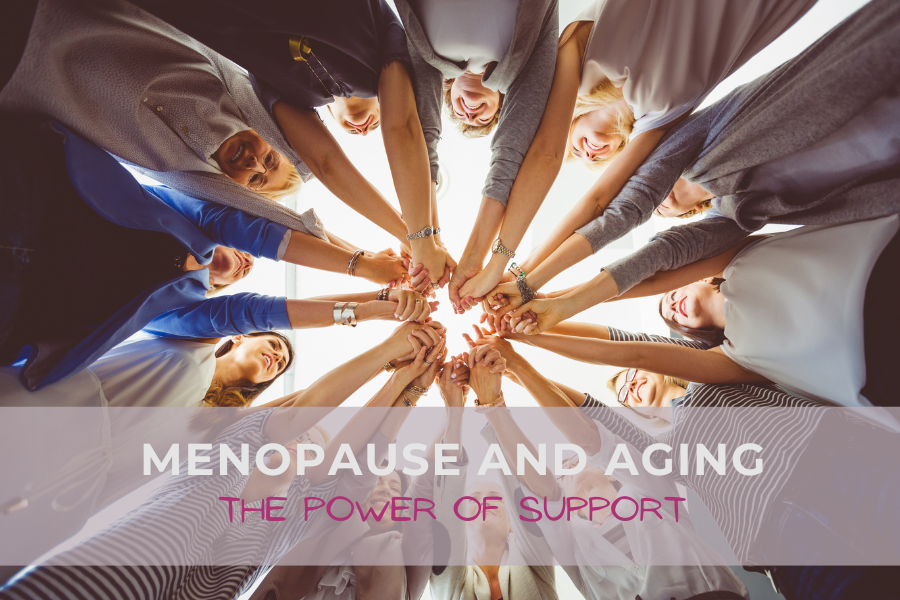Aging and menopause are both inevitable journeys that we all embark upon and as the pages of time turn, menopause emerges as a significant milestone for women.
This transition brings about physical changes and ushers in emotional shifts that underscore the importance of maintaining connections and avoiding loneliness.
In this context, the revolutionary work of Professor Rose Anne Kenny, a distinguished geriatrician, resonates deeply as she delves into healthy aging in her book "Age Proof: The New Science of Living a Longer and Healthier Life."
Menopause: Unraveling the Transition
Menopause, typically occurring between the ages of 45 and 55, is a natural biological shift that marks the conclusion of a woman's reproductive years.
It has various symptoms, including hot flashes, mood swings, sleep disturbances, and cognitive alterations.
However, the psychological implications often eclipse the physical changes, impacting mental health and overall well-being.
Insights on Holistic Aging
Professor Rose Anne Kenny's work is groundbreaking in healthy aging.
Whereas her book "Age Proof" delves into the scientific underpinnings of leading a longer, healthier life.
Additionally, Kenny advocates for a comprehensive approach to aging that encompasses physical, mental, and emotional dimensions.
She notes that healthy aging is not just about eating right and exercise but the crux of longevity and quality of life lies in having connections and relationships.
Gendered Ageism and the Workplace
As women traverse the path of menopause, they encounter complex connections of biological and social factors.
In the workplace, gendered ageism, as highlighted in a post written by the Harvard Business Review, can emerge.
Menopausal symptoms like sleeplessness, anxiety, brain fog, and cognitive shifts might impact job performance.
As a result, women may face misconceptions or biases about their age, leading to stigmatization and professional challenges.
Fostering Support Networks in the Workplace
Professor Kenny's research amplifies the significance of social networks.
This can be extremely beneficial particularly within the workplace context.
As women grapple with the multifaceted challenges of menopause and age-related gender bias, having a supportive environment becomes paramount.
Therefore, colleagues, supervisors, and human resources personnel play a crucial role in creating a workplace culture that values and accommodates women navigating menopausal changes.
Ideas for workplace support
Acknowledging the challenges women face during this transitional period and the gendered ageism that can compound these challenges, it becomes imperative to offer education and foster robust support networks.
With that in mind, let's explore ideas to promote awareness, create understanding, and build inclusive communities within the workplace.
Open Dialogues
Firstly, a company can consider creating safe spaces for open discussions about menopause.
Secondly, regular meetings or forums where women can share their experiences and challenges can encourage a sense of camaraderie and provide an avenue for mutual support.
Thirdly, encourage open-minded listening and discourage judgment to ensure these conversations are constructive.
Mentorship Programs
Establish mentorship programs that connect women going through menopause with experienced colleagues who have navigated similar challenges.
Mentors can provide guidance, share coping strategies, and offer emotional support.
As a result, this dynamic fosters a sense of community and solidarity among women of different ages.
Employee Resource Groups
Establish research groups focused on women's health and well-being, specifically targeting menopause.
These groups can organize events, share resources, and advocate for policies that address the needs of women navigating this phase of life.
Consequently, these groups can promote a sense of belonging and encourage collaboration.
Manager Training
Provide training for managers on how to support employees experiencing menopausal symptoms.
Educate managers about the challenges women might face, and equip them with tools to have empathetic and productive conversations about accommodations and adjustments.
The Power of Support Networks
Support networks can manifest through open conversations, empathy, and flexibility.
It is essential to create a space where women can candidly discuss their experiences without fear of judgment.
For example, establishing flexible work arrangements, modified schedules, or opportunities for rest can help women manage symptoms while continuing to contribute meaningfully.
Recognition and Celebrations
Recognize and celebrate women's diverse contributions throughout their careers, including during and beyond menopause.
Acknowledge achievements and milestones, reinforcing the message that age is not a barrier to success.
Shattering Stigma Through Education
Education is a powerful tool against ageism and the associated biases.
Employers and employees alike can benefit from awareness programs that shed light on the realities of menopause and its potential impacts on work performance.
Therefore, understanding the diversity of experiences can pave the way for a more inclusive and accommodating work environment.
Educational Workshops and Seminars
Hosting workshops and seminars that provide comprehensive information about menopause.
Invite healthcare professionals to discuss the physical, emotional, and cognitive changes that women might experience.
Highlighting the normalcy of these changes can help dispel myths and misconceptions, fostering empathy and understanding among colleagues.
Embracing Change, Shaping Inclusion
The journey through menopause and aging is not an isolated event but a transformative process.
Professor Kenny's insights guide us to acknowledge the power of support networks in the workplace.
By championing inclusivity, empathy, and education, organizations can create environments where women feel valued, understood, and empowered to navigate menopausal challenges while contributing their best.
Conclusion
In conclusion, life pages continue to turn as women navigate the intricate path of menopause and aging.
The work of Professor Rose Anne Kenny reminds us that a workplace enriched by supportive networks is essential.
As women face the intersection of menopausal symptoms and gendered ageism, these networks serve as beacons of empowerment, breaking down barriers and shaping a future where women can embrace change with resilience and triumph.
MORE POSTS YOU'LL LOVE
Menopause and Aging: The Power of Support

by DR. BIANCA BELDINI
August 9, 2023
This post may contain affiliate links. Please read full disclosure here.


